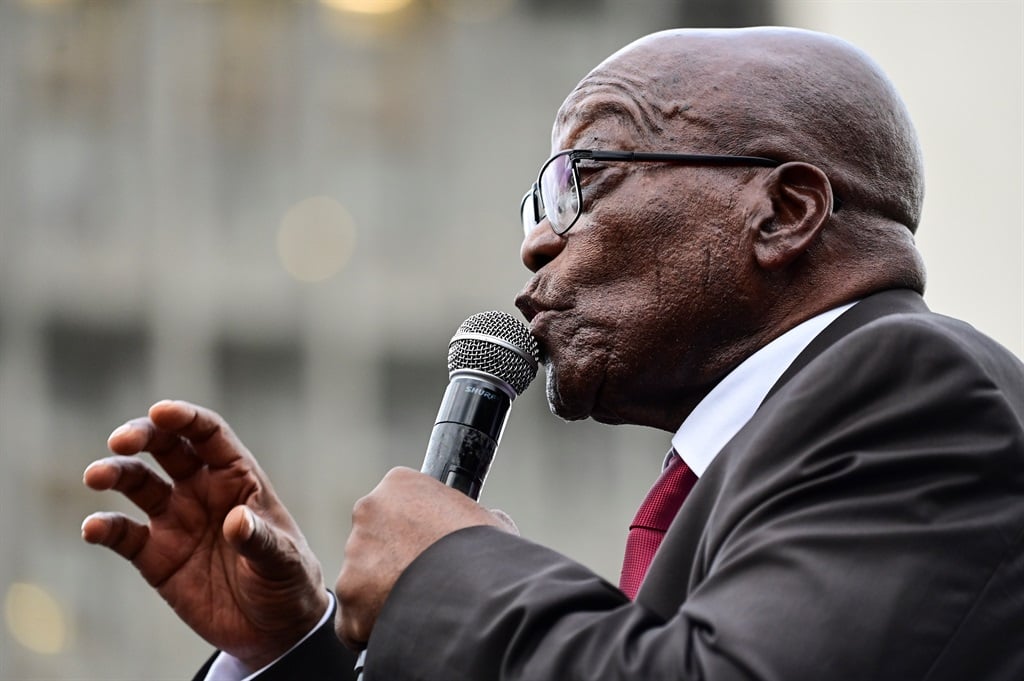

The IEC has confirmed Jacob Zuma’s face will be on the ballot paper on 29 May. (Darren Stewart/Gallo Images)
- The IEC has said Jacob Zuma’s face will be on the ballot paper after an MK Party leadership shake-up.
- The newly formed political party previously threatened violence if Zuma’s face was blocked.
- Find everything you need to know about the 2024 general elections on News24’s Elections Hub.
The Electoral Commission of South Africa (IEC) has confirmed uMkhonto weSizwe (MK) Party leader Jacob Zuma’s face will be on the ballot paper on 29 May.
The newly formed political party previously threatened violence if Zuma’s face on the ballot was blocked.
Deputy IEC CEO Masego Sheburi said: “We can confirm that the face of the party on the ballot paper for the uMkhonto weSizwe Party will be that of Mr Jacob Zuma because the party has given us notice that it has changed its leadership structure.
“Mr [Jabulani] Khumalo is no longer the party leader; Mr Zuma is the official party leader.”
Regarding the IFP, Sheburi added while the party used the face of the late Mangosuthu Buthelezi on the campaign trial and its regalia, the party leader was Velenkosini Hlabisa.
“For that reason, only the face of Mr Hlabisa will appear on the ballot paper.”
He said the IEC did not interfere with how political parties managed their campaign activities.
“Section 68 of the Electoral Act gives the commission broad-ranging powers to determine the design, look and feel identifiers of our ballot.”
READ | IEC rejects calls for Janet Love’s resignation amid Zuma and MKP’s bias claims
On South Africans voting abroad, Sheburi said embassies, consulates, or an office of the high commission were considered voting stations.
“The Electoral Court, having heard arguments before it, extended relief that says an honorary consul should be read in to mean a consulate.
“There are, however, still no reasons for that judgment, on our part, to not create perceptions that we are second-guessing or do not want to comply with the decisions of the court.
“We have written to the Department of International Relations and Cooperation, within whose remit the power to administer foreign missions resides, to establish from them the steps to be taken in the time remaining before the elections to give effect to the order of the court.”
READ | Jacob Zuma can contest elections, Electoral Court rules
He was referring to the DA’s victorious court challenge after it had written letters to the IEC and Department of International Relations and Cooperation to request that embassies, high commissions, and consulates be used as voting stations.
On observers and observer missions, Sheburi said the international best practice was that where observer missions were sent, they were constituted by multilateral entities like SADC, the African Union, or independent NGOs that were not part of state machinery.
“We have never had to deal with a sovereign state. We welcome observers, and in all elections, we have accredited observers that came from multilateral organisations, NGOs, and democracy building institutions.”
READ | Mpumelelo Mkhabela: Jacob Zuma’s candidacy sparks historic electoral dispute
Updating the media on the progress made in preparation for the May general elections, IEC CEO Sy Mamabolo said on 12 April, it issued certificates to 14 889 candidates who would contest 887 seats.
After the verification and objection process, Mamabolo added the IEC published the names of 70 political parties and 11 independent candidates on its website.
“Fifteen political parties are contesting all tiers of the elections, which means the compensatory seats in the National Assembly, the nine province-to-national elections, and the nine provincial legislatures.
“A total of 31 political parties will contest the national elections for the first time.”
He said the country’s 27.79 million registered voters would receive three ballot papers to elect candidates to represent them in the National Assembly and provincial legislatures.
“There are a total of 400 contested seats in the National Assembly.
“The proportional representation compensatory 200 seats will be contested by political parties only, and there is a dedicated ballot paper for this tier of the National Assembly.
“The remaining regional or province-to-national 200 seats will be contested by independent candidates and political parties.
“This tier of the National Assembly will also have a dedicated ballot paper. This means that National Assembly elections will be based on two ballot papers [national ballot and the newly introduced regional or province-to-national ballot].”
The list of addresses of the 23 292 voting stations, which will be used in the elections, has been published on the IEC’s website.